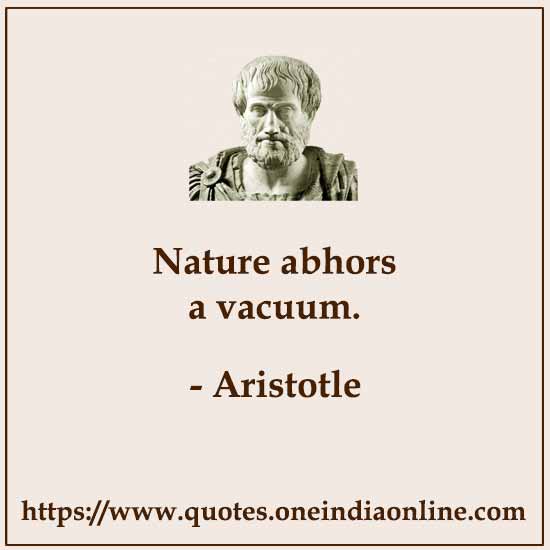Nature abhors a vacuum.
Aristotle Quotes in English

Aristotle’s idea that “Nature abhors a vacuum” comes from his study of the world around him. He observed that empty spaces, or vacuums, could not naturally exist because he believed everything in nature is connected. In his view, an empty space would disturb the natural balance and harmony of the physical universe.
In his understanding of physics, Aristotle proposed that the four basic elements—earth, water, air, and fire—move naturally to their correct places. For example, earth and water tend to sink downward, while fire and air rise upward. If a vacuum were to occur, the surrounding materials would quickly rush in to fill that empty space. This is because nature, in Aristotle's view, seeks to maintain balance and order. He thought that the forces of nature were designed to prevent any area from remaining empty.
Aristotle also believed that movement could only happen if there was a medium, such as air or water. Without a medium, which would be the case in a vacuum, movement could not take place. Therefore, he concluded that nature would not allow a vacuum to persist. Although modern science has proven this idea to be incorrect, especially with the understanding of vacuums in outer space, Aristotle’s reasoning was a sincere effort to explain the natural phenomena based on the knowledge available to him during his lifetime.
On a different level, the phrase “Nature abhors a vacuum” can be seen as a metaphor, suggesting that when there is an empty space in life or nature, something will eventually fill that space. This idea can be applied in various ways:
In terms of human behavior and society, just as nature cannot stand a vacuum, individuals and communities tend to fill voids. When there is a lack of leadership, knowledge, or direction, new leaders, ideas, or actions often emerge to fill that gap. For instance, in a political setting, if there is a power vacuum, it may quickly be filled by new groups or individuals who are ready to take charge.
On a personal level, this concept can also relate to how individuals confront emotional or psychological emptiness. When someone feels a void in their life, such as after losing a relationship or lacking purpose, they often seek to fill that emptiness with something else—be it a new relationship, a new goal, or even distractions.
In summary, Aristotle’s assertion that nature abhors a vacuum, while rooted in his ancient understanding of physics, has evolved into a broader philosophical and metaphorical idea. It illustrates how both the natural world and human beings instinctively strive to fill empty spaces, whether in the physical environment, emotional landscape, or social structures.